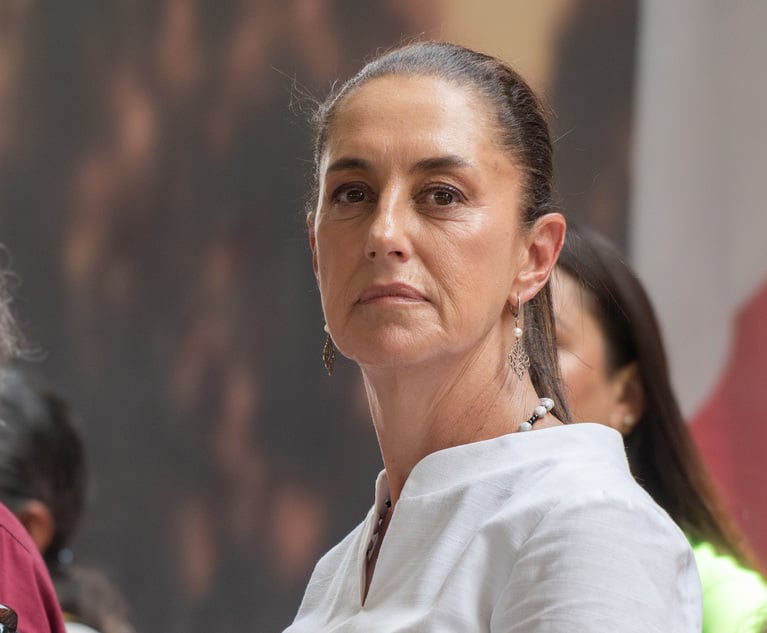EU Court Rules Items From Israeli Settlements Must Be Labelled as Produced in Occupied Territories
Labels must "prevent consumers from being misled as to the fact that the State of Israel is present in the territories concerned as an occupying power and not as a sovereign entity," the Court said.
November 12, 2019 at 01:07 PM
4 minute read
 The Court of Justice of the European Union. Photo: Shutterstock.com
The Court of Justice of the European Union. Photo: Shutterstock.com
The European Union's top court ruled on Tuesday that products made in Israeli settlements must be clearly labelled as produced in the Occupied Territories when sold in EU countries.
In its ruling, the Luxembourg-based European Court of Justice (ECJ) said goods from territories occupied by Israel "must bear the indication of their territory of origin", and that where goods come from an Israeli settlement within that territory, this should also be indicated. Labels, the court said, must not imply that goods produced in the Occupied Territories come from Israel itself.
The judgment stems from a case brought by Psagot Winery and the European Jewish Association against the French government. Psagot Winery, which is based in the Israeli-occupied West Bank, challenged a French law requiring wine labels to state that its products came from Israeli settlements in the Occupied Territories, arguing that this was not in line with EU labelling rules. France's Supreme Court, the Conseil d'Etat, referred the case to the ECJ as the final arbiter of EU law.
Read more of our global coverage here.
In its ruling, the court concluded that the products could not be labelled "Israel" because labels must "prevent consumers from being misled as to the fact that the State of Israel is present in the territories concerned as an occupying power and not as a sovereign entity".
The EU has strongly opposed the expansion of Israeli settlements, saying such settlements use land claimed by Palestinians and undermine any hope for a two-state solution. Israel says the labelling is unfair and discriminatory and that other countries involved in disputes over land are not treated the same way.
But the court stated that EU labelling rules were designed to provide consumers with a range of information about products. This included information that would enable consumers to make choices based on ethical criteria, including that a product originated in a territory that was under illegal occupation according to international law.
"The provision of information to consumers must enable them to make informed choices, with regard not only to health, economic, environmental and social considerations, but also to ethical considerations and considerations relating to the observance of international law. The Court underlined in that respect that such considerations could influence consumers' purchasing decisions," the ruling said.
Labelling products that have been made in the Occupied Territories as coming from Israel could mislead consumers, the court said.
While the winery that brought the case is based in the West Bank, the court applied its ruling to all territory captured by Israel in the 1967 war, including east Jerusalem and the Golan Heights, both of which Israel has annexed, as well as the West Bank.
The court's judgment follows the recommendation of one of the ECJ's advocate generals, Gerard Hogan, who recommended that the court rule that labels should indicate that items were produced in the Occupied Territories if they came from Israeli settlements there.
François-Henri Briard, lead counsel for Psagot Winery, said the court was wrong and its ruling was political.
"EU rules are there to provide fair and relevant information to consumers, not to cater to political prejudices," he said in a statement. "If such labelling is applied to Israeli products, surely it will also need to be applied to scores of other countries around the world [that] could be argued to be in violation of international law."
Israel's foreign ministry said the ruling "serves as a tool in the political campaign against Israel", and the Israeli foreign minister, Israel Katz, told Reuters he would work with foreign ministers of EU countries to prevent its implementation.
Psagot Winery has hired Covington & Burling to lobby against implementation of EU regulations on country-of-origin labels. Records list Stuart Eizenstat, former ambassador to the EU, as the lead lobbyist. Covington did not respond to a request for comment.
The Lawfare Project, a group of legal professionals that campaigns for Israeli interests, said in a statement that the court's decision "mandates religious discrimination" by treating Jewish-owned and Muslim-owned businesses differently, even if they operate in the same geographic location. It also said the decision was "driven by foreign policy concerns".
"It also opens up a Pandora's box of unintended consequences, allowing anyone to sue to add labelling requirements based on subjective 'ethical considerations'," the statement said.
This content has been archived. It is available through our partners, LexisNexis® and Bloomberg Law.
To view this content, please continue to their sites.
Not a Lexis Subscriber?
Subscribe Now
Not a Bloomberg Law Subscriber?
Subscribe Now
NOT FOR REPRINT
© 2025 ALM Global, LLC, All Rights Reserved. Request academic re-use from www.copyright.com. All other uses, submit a request to [email protected]. For more information visit Asset & Logo Licensing.
You Might Like
View All
South African Legal Council to Oppose Norton Rose Over Ethnicity Score System
3 minute read
Israel's Rushed Corporate Tax May Spark Law Firm Mergers, Boost Large Firms Including Gornitzky
4 minute read
Ex-Mayer Brown Corporate Lawyer Leads Race for German Chancellor in Snap Election
4 minute read
Mexico Dissolves Antitrust Authority in Setback to Competition
Trending Stories
- 1Family Court 2024 Roundup: Part I
- 2In-House Lawyers Are Focused on Employment and Cybersecurity Disputes, But Looking Out for Conflict Over AI
- 3A Simple 'Trial Lawyer' Goes to the Supreme Court
- 4Clifford Chance Adds Skadden Rainmaker in London
- 5Latham, Kirkland and Paul Weiss Climb UK M&A Rankings
Who Got The Work
J. Brugh Lower of Gibbons has entered an appearance for industrial equipment supplier Devco Corporation in a pending trademark infringement lawsuit. The suit, accusing the defendant of selling knock-off Graco products, was filed Dec. 18 in New Jersey District Court by Rivkin Radler on behalf of Graco Inc. and Graco Minnesota. The case, assigned to U.S. District Judge Zahid N. Quraishi, is 3:24-cv-11294, Graco Inc. et al v. Devco Corporation.
Who Got The Work
Rebecca Maller-Stein and Kent A. Yalowitz of Arnold & Porter Kaye Scholer have entered their appearances for Hanaco Venture Capital and its executives, Lior Prosor and David Frankel, in a pending securities lawsuit. The action, filed on Dec. 24 in New York Southern District Court by Zell, Aron & Co. on behalf of Goldeneye Advisors, accuses the defendants of negligently and fraudulently managing the plaintiff's $1 million investment. The case, assigned to U.S. District Judge Vernon S. Broderick, is 1:24-cv-09918, Goldeneye Advisors, LLC v. Hanaco Venture Capital, Ltd. et al.
Who Got The Work
Attorneys from A&O Shearman has stepped in as defense counsel for Toronto-Dominion Bank and other defendants in a pending securities class action. The suit, filed Dec. 11 in New York Southern District Court by Bleichmar Fonti & Auld, accuses the defendants of concealing the bank's 'pervasive' deficiencies in regards to its compliance with the Bank Secrecy Act and the quality of its anti-money laundering controls. The case, assigned to U.S. District Judge Arun Subramanian, is 1:24-cv-09445, Gonzalez v. The Toronto-Dominion Bank et al.
Who Got The Work
Crown Castle International, a Pennsylvania company providing shared communications infrastructure, has turned to Luke D. Wolf of Gordon Rees Scully Mansukhani to fend off a pending breach-of-contract lawsuit. The court action, filed Nov. 25 in Michigan Eastern District Court by Hooper Hathaway PC on behalf of The Town Residences LLC, accuses Crown Castle of failing to transfer approximately $30,000 in utility payments from T-Mobile in breach of a roof-top lease and assignment agreement. The case, assigned to U.S. District Judge Susan K. Declercq, is 2:24-cv-13131, The Town Residences LLC v. T-Mobile US, Inc. et al.
Who Got The Work
Wilfred P. Coronato and Daniel M. Schwartz of McCarter & English have stepped in as defense counsel to Electrolux Home Products Inc. in a pending product liability lawsuit. The court action, filed Nov. 26 in New York Eastern District Court by Poulos Lopiccolo PC and Nagel Rice LLP on behalf of David Stern, alleges that the defendant's refrigerators’ drawers and shelving repeatedly break and fall apart within months after purchase. The case, assigned to U.S. District Judge Joan M. Azrack, is 2:24-cv-08204, Stern v. Electrolux Home Products, Inc.
Featured Firms
Law Offices of Gary Martin Hays & Associates, P.C.
(470) 294-1674
Law Offices of Mark E. Salomone
(857) 444-6468
Smith & Hassler
(713) 739-1250








